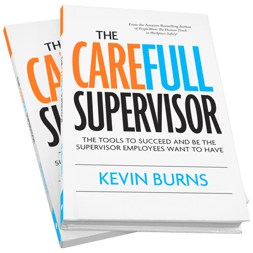Here's a hard truth: employees rarely leave a job for a small pay bump. They leave because of poor supervision or an unsatisfying work environment. The good news? By focusing on three key areas - health, wealth, and relationships - supervisors can create a workplace where teams not only stay but thrive.

It's no secret that employees don't just leave jobs for a few bucks an hour. They leave their supervisors and a disappointing work environment. To keep your valuable team members and foster a positive workplace culture, it's crucial to focus on three fundamental pillars: health, wealth, and relationships.
Pillar 1: Health - Fostering a Safe and Supportive Environment
A healthy workplace goes beyond just physical safety; it encompasses mental and emotional well-being too. As a supervisor, you play a critical role in creating an environment where your team feels secure and supported.
Physical Safety:
- Prioritize and promote safety protocols consistently
- Lead by example in following safety procedures
- Regularly assess and address potential hazards
- Provide comprehensive safety training and refresher courses
Mental and Emotional Well-being:
- Encourage open communication about workplace concerns
- Create a culture where employees feel comfortable expressing their thoughts
- Address conflicts promptly and fairly
- Promote work-life balance and stress management
By focusing on both physical and psychological safety, you create a foundation of trust and security. This allows your team to focus on their work without unnecessary distractions or anxieties.
Pillar 2: Wealth - Providing Opportunities for Growth and Development
While competitive pay is important, true job satisfaction comes from feeling that there's potential for growth and advancement. As a supervisor, you can help your team members develop their skills and progress in their careers.
Professional Development:
- Identify and nurture individual strengths within your team
- Provide regular feedback on performance and areas for improvement
- Offer mentoring or coaching to help employees reach their goals
- Advocate for training opportunities and skill-building workshops
Career Advancement:
- Discuss career aspirations with your team members
- Help create clear pathways for advancement within the organization
- Recognize and reward exceptional performance
- Encourage cross-training and job rotations to broaden skill sets
By investing in employee growth, you're increasing their value to the organization and showing that you care about their long-term success. This fosters loyalty and motivation, as team members see a future for themselves within the company.
Pillar 3: Relationships - Building a Positive and Supportive Work Culture
The quality of relationships in the workplace, especially between supervisors and employees, can make or break job satisfaction. As a frontline supervisor, you have the power to create a positive work culture that promotes trust, respect, and collaboration.
Effective Communication:
- Practice active listening to truly understand your team's concerns
- Provide clear and constructive feedback regularly
- Be approachable and open to suggestions from your team
- Communicate expectations and goals clearly
Building Trust and Respect:
- Treat all team members fairly and consistently
- Recognize and appreciate individual contributions
- Show empathy and understanding during challenging times
- Lead by example in terms of work ethic and professionalism
Team Building:
- Organize team-building activities to strengthen relationships
- Encourage collaboration and knowledge sharing among team members
- Celebrate team successes and milestones together
- Address conflicts promptly and facilitate resolution
By fostering positive relationships, you create a work environment where employees feel valued, supported, and part of a cohesive team. This not only improves job satisfaction but also enhances overall productivity and performance.
Key Takeaways:
- Prioritize both physical safety and mental well-being to create a healthy work environment where employees feel secure and supported.
- Invest in your team's professional development and provide clear paths for advancement to satisfy their need for growth and financial stability.
- Foster positive relationships through effective communication, trust-building, and team-building efforts to create a supportive and collaborative work culture.
As a frontline supervisor, you have the power to significantly impact your team's job satisfaction and overall well-being. By focusing on the three pillars of health, wealth, and relationships, you can create a work environment that not only retains valuable employees but also attracts top talent.
Remember, being a great supervisor isn't just about managing tasks and meeting deadlines. It's about creating an environment where your team feels safe, valued, and motivated to give their best. By addressing these fundamental needs, you'll not only improve your team's performance but also contribute to a more positive and productive workplace culture.
If you're looking to deepen your understanding of effective supervision and learn practical strategies to implement these principles, I highly recommend picking up a copy of "The CareFull Supervisor." This comprehensive guide offers valuable insights and tools to help you excel in your role as a frontline supervisor.
Remember, great workplaces are built by great supervisors. Our PeopleWork Supervisor Academy helps supervisors focus on health, wealth, and relationships, so they can become the kinds of supervisors that employees are eager to work with and give their best effort.





